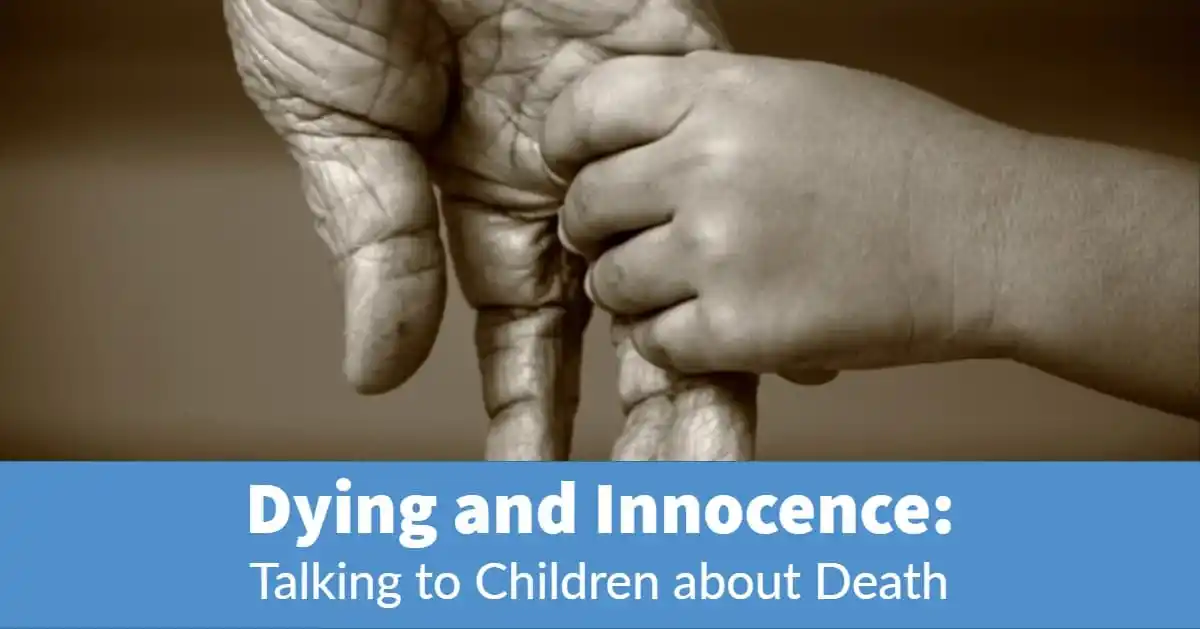Dying and Innocence: Talking to Children about Death
I was 6 years old when first introduced to the concept of death. My great grandma, Delilah Delaney, passed away from “old age” in the spring of ‘83. I remember my family going to see her at, what we affectionately dubbed, the “old folks home” to pay our final respects.
As she lay dying in her hospital bed, my aunts and uncles lined her room. They were appropriately tearful and somber taking turns holding her hand and reminiscing. To me, it just seemed like any old family gathering. Except Great Granny’s eyes were closed the whole time and she was silent, except for her breathing. I had barely known the woman and had little to no understanding of death at that age. So, I just stood there with my head bowed, silently looking down at the institutional green tiles on the floor. I didn’t understand why all the adults were sad, but I tried to mirror their somber mood.
Afterwards, my sister and I ran to the grocery store with my dad. As we were walking across the King Soopers parking lot holding hands, my dad explained the finality of death. As we entered the store to purchase milk for the week, I learned that once Great Granny died we would never, ever see her again until we joined her in heaven. My heart froze. Not at the loss of our family matriarch. Instead, I thought of myself — the baby of the family – suddenly alone. I found myself thinking of that inevitable and dreadful day when my siblings and parents (who were all older than me) would die. Thus, leaving me all alone on this great, big, rotating rock.
Sensing something was off, my Dad asked what I was thinking. When I told him about my concerns, he just laughed. He further explained that life wasn’t a finite process, ending on a specific date and time. We don’t all die at a certain age. “No,” he said, “we could all go at any time.”
“the existential crisis soon passed and was replaced with more age-appropriate concerns”
This was no less comforting to my tiny ears. The prospect of being swiftly and unexpectedly rounded up by the grim reaper consumed my thoughts for the next few weeks. Lying awake in bed, I wondered if this is the night I was going to die? Would I just stop breathing in my sleep? Would it be painful? Or would I get hit by a car in the morning? I wanted to know how and when I would die. Not knowing was torture.
Fortunately for my 6-year-old self, the existential crisis soon passed and was replaced with more age-appropriate concerns, such as whether or not my sister would share her Hawaiian Fun Barbie doll with me. That’s not to say that I didn’t still have questions. For example, my family still loved to tell the story of me at Delilah’s funeral.
Being the good Catholics that we are, we held her funeral in a church. Her body was put on display in an open casket. She was clothed in her favorite, blue dress with tiny white flowers, surrounded by floral arrangements at the altar. I watched from my pew as friends and family respectfully filed past her. They would kneel, say a silent prayer, make the sign of the cross, before standing and allowing the next in line to do the same.
“I wondered aloud… why Great Granny was in a suitcase? It seemed the entire church heard me.”
Not having an internal editor, I wondered aloud (and perhaps too loud for church) why Great Granny was in a suitcase? It seemed the entire church heard me. Everyone stopped in their tracks and laughed. I hadn’t meant it to be funny and was suddenly embarrassed. I buried my face in the sleeve of my father’s suit jacket as if to hide. To my surprise, my dad wasn’t mad. Instead, he hugged me and explained that it was a coffin – not a suitcase. And that we would bury the coffin with her body inside it in the ground at a cemetery. She would get a headstone to mark the site with her name and the dates of her life, so that our family could visit her remains any time they’d like. This was meant to be an honorable and good resting spot for her body now that her spirit was in heaven. It all made perfect sense once he explained it. However, I was very fortunate to have an adult with whom I could talk to and ask questions about death.
Now, as a hospice nurse and mother of 3 school-aged children, my kids are exposed to concepts like “funerals” and “death” a lot more than I ever was at their tender ages of 8 years, 6 years and 2 years old. I appreciate how painful death and dying can be for adults to process emotionally and spiritually. However, if those same adults think that the small children in the room don’t understand or will even remember a loved one’s death, I’m here to tell you, you’re wrong.
This all looked and felt very different from the nursing home visit to me. It was a lot more ritualistic and the adults all seemed to know what they were supposed to do. Great Granny’s eyes were still closed. However, there was no longer the subtle rise and fall of her chest to detect any breathing. And her skin. It was so weird. She had a pale, almost waxy appearance. I thought she looked more like a doll than a person. All the grown-ups around me were still sad. A few of the women had stuffed partially-used Kleenex into their sleeves and had traces of mascara running down their faces. Before the mass started, the church was silent except for the occasional nose-blow.
Now, as a hospice nurse and mother of 3 school-aged children, my kids are exposed to concepts like “funerals” and “death” a lot more than I ever was at their tender ages of 8 years, 6 years and 2 years old. I appreciate how painful death and dying can be for adults to process emotionally and spiritually. However, if those same adults think that the small children in the room don’t understand or will even remember a loved one’s death, I’m here to tell you, you’re wrong.
Though I am not a trained psychologist, based on my personal experiences I can offer the following advice when talking to your school-aged kids and grandkids about death:
Say the words
While kids develop at different paces, most can understand the concept of death between 5-7 years. So, when talking to children in this age range or older, be sure to use the words “death” or “dead.” Don’t avoid them or make them taboo. Saying things like “passing away” or “moving on” are poetic, but open to interpretation. Using them in place of saying “Great Granny died” only confuses and complicates the grieving process for everyone.
Open Up
It’s okay to be honest and explain the finality of death to small kids. Just allow for a two-way conversation about it. Remember that if my dad had closed the door on our discussion on the way to the grocery store, who knows how long I would have gone on believing my family was all going to die before me. These discussions can really assist to flush out any misinformation and clarify your cultural or spiritual beliefs, not to mention assuage any fears based on falsehoods.
Include them
Bring your kids to the death bed or funeral home and allow them to participate in the grieving process. Remind them that it’s not play time. However, if they can be respectful, it makes them feel like a valued member of your family and helps them understand why you’re sad and crying. Also, it’s okay to cry in front of small kids. It’s completely healthy for adult men and women to cry in front of their children when a loved one dies.
Exposure to death and dying is inevitable. But how we approach, talk about, and explain the process, makes all the difference in what positive and negative associations are created.
Sold Out hospice stories on our hospice blog
Please feel free to contact us with any questions regarding hospice care


